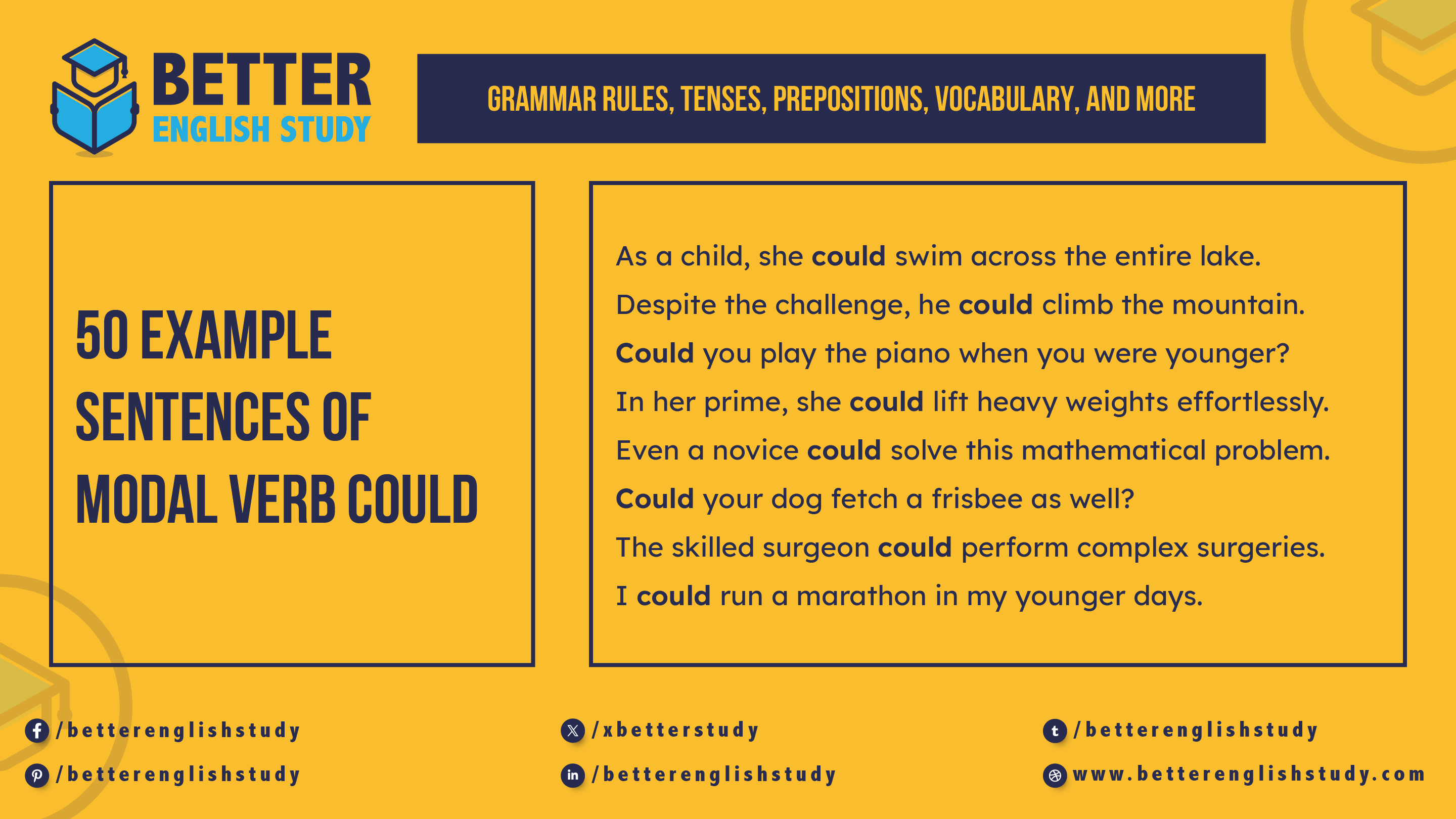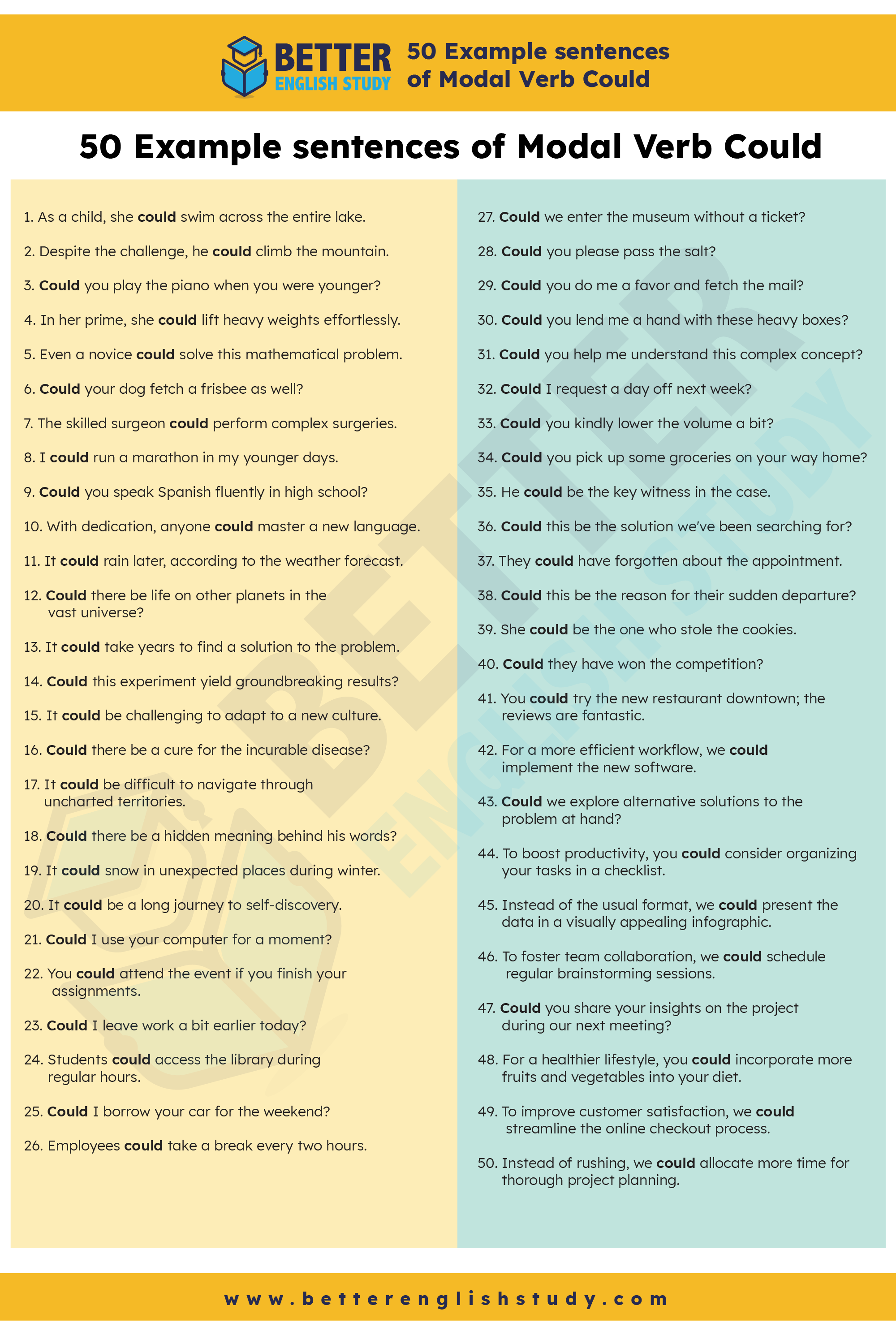
The modal verb “could” is a versatile and powerful element of the English language, conveying notions of ability, possibility, permission, and polite requests. Understanding the varied contexts in which “could” can be employed is crucial for effective communication.
In this article, we’ll explore 50 example sentences that showcase the multifaceted nature of the “could” modal verb.
When to Use Could
Before delving into the examples, let’s grasp the essence of when to use “could.” This versatile modal verb often signifies past ability, making polite requests, suggesting possibilities, or expressing conditional statements. It adds a layer of politeness and uncertainty to your conversations, making it an invaluable addition to your language repertoire.
Let’s explore the examples for a better understanding.
1. Past Ability
- As a child, she could swim across the entire lake.
- Despite the challenge, he could climb the mountain.
- Could you play the piano when you were younger?
- In her prime, she could lift heavy weights effortlessly.
- Even a novice could solve this mathematical problem.
- Could your dog fetch a frisbee as well?
- The skilled surgeon could perform complex surgeries.
- I could run a marathon in my younger days.
- Could you speak Spanish fluently in high school?
- With dedication, anyone could master a new language.
2. Future Possibility
- It could rain later, according to the weather forecast.
- Could there be life on other planets in the vast universe?
- It could take years to find a solution to the problem.
- Could this experiment yield groundbreaking results?
- It could be challenging to adapt to a new culture.
- Could there be a cure for the incurable disease?
- It could be difficult to navigate through uncharted territories.
- Could there be a hidden meaning behind his words?
- It could snow in unexpected places during winter.
- It could be a long journey to self-discovery.

3. Permission
- Could I use your computer for a moment?
- You could attend the event if you finish your assignments.
- Could I leave work a bit earlier today?
- Students could access the library during regular hours.
- Could I borrow your car for the weekend?
- Employees could take a break every two hours.
- Could we enter the museum without a ticket?
4. Polite Requests
- Could you please pass the salt?
- Could you do me a favor and fetch the mail?
- Could you lend me a hand with these heavy boxes?
- Could you help me understand this complex concept?
- Could I request a day off next week?
- Could you kindly lower the volume a bit?
- Could you pick up some groceries on your way home?
5. Deduction and Possibility
- He could be the key witness in the case.
- Could this be the solution we’ve been searching for?
- They could have forgotten about the appointment.
- Could this be the reason for their sudden departure?
- She could be the one who stole the cookies.
- Could they have won the competition?
6. Suggestion
- You could try the new restaurant downtown; the reviews are fantastic.
- For a more efficient workflow, we could implement the new software.
- Could we explore alternative solutions to the problem at hand?
- To boost productivity, you could consider organizing your tasks in a checklist.
- Instead of the usual format, we could present the data in a visually appealing infographic.
- To foster team collaboration, we could schedule regular brainstorming sessions.
- Could you share your insights on the project during our next meeting?
- For a healthier lifestyle, you could incorporate more fruits and vegetables into your diet.
- To improve customer satisfaction, we could streamline the online checkout process.
- Instead of rushing, we could allocate more time for thorough project planning.
These 50 example sentences highlight the diverse ways the modal verb “could” can be utilized in English. From expressing past abilities and exploring possibilities to seeking permission and making polite requests, “could” serves as a valuable linguistic tool.
